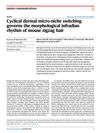 4 citations,
August 2023 in “Nature Communications”
4 citations,
August 2023 in “Nature Communications” Mouse zigzag hair bends form due to a 3-day cycle of changes in hair progenitors and their environment.
 4 citations,
May 1999 in “PubMed”
4 citations,
May 1999 in “PubMed” Some medications can cause reversible hair loss by affecting hair growth cycles.
 January 2021 in “Journal of Allergy and Therapy”
January 2021 in “Journal of Allergy and Therapy” Electric Follicle Stimulation may promote hair growth and density with no known side effects.
 December 2021 in “Journal of clinical images and medical case reports”
December 2021 in “Journal of clinical images and medical case reports” PRP generally shows better results for hair regrowth than mesotherapy, but more research is needed.
 33 citations,
January 2002
33 citations,
January 2002 Latanoprost, a glaucoma drug, showed potential for promoting hair growth in bald monkeys, especially at higher doses.
 38 citations,
June 2003 in “Journal of Investigative Dermatology Symposium Proceedings”
38 citations,
June 2003 in “Journal of Investigative Dermatology Symposium Proceedings” Accurate clinical, histological, and genetic methods are key for understanding and treating hair disorders.
 June 2020 in “Journal of cosmetic medicine”
June 2020 in “Journal of cosmetic medicine” Eyebrow transplants use hair from the scalp or pubic area, with blonde hair looking more natural, and can leave scars depending on the method used.
 63 citations,
October 2005 in “Archives of Dermatology”
63 citations,
October 2005 in “Archives of Dermatology” Shorter, thinner hairs indicate AGA, while longer, thicker hairs suggest CTE; counting and measuring shed hairs helps diagnose hair loss type.
8 citations,
April 2016 in “Experimental dermatology” B6.Cg-Tyr c−2J Hr hr /J mice have a stronger delayed sunburn reaction and are good for UV research.
 January 2025 in “International Journal of Advanced Research in Science Communication and Technology”
January 2025 in “International Journal of Advanced Research in Science Communication and Technology” Polyherbal hair dyes are safer and more eco-friendly than chemical dyes.
 129 citations,
January 2009 in “International Journal of Trichology”
129 citations,
January 2009 in “International Journal of Trichology” Trichoscopy can diagnose female hair loss with high accuracy by looking for specific patterns in hair and scalp appearance.
 2 citations,
March 2017 in “Archives of Plastic Surgery”
2 citations,
March 2017 in “Archives of Plastic Surgery” Intense pulsed light is a safe and effective way to thin hair for East Asians after hairline surgery.
 November 2023 in “Research Square (Research Square)”
November 2023 in “Research Square (Research Square)” NIR-II imaging effectively tracked stem cells that helped repair facial nerve defects in rats.
 December 2020 in “International journal of research in ayurveda and pharmacy”
December 2020 in “International journal of research in ayurveda and pharmacy” Eating well and avoiding synthetic hair products are key for healthy hair.
September 2022 in “International Journal of Trichology” Trichoscopic measurements help determine the severity of female pattern hair loss.
1 citations,
March 2021 in “Frontiers in Medicine” Female pattern hair loss shows similar characteristics in both genders and should be classified by hair loss patterns, not gender.
 January 2023 in “Vìsnik problem bìologìï ì medicini”
January 2023 in “Vìsnik problem bìologìï ì medicini” Androgenic alopecia causes hair follicle degradation and skin restructuring, but some hair elements remain.
 22 citations,
May 2002 in “Skin Research and Technology”
22 citations,
May 2002 in “Skin Research and Technology” CE-PTG detects early hair follicle issues in balding areas, helping measure male hair loss.
 September 2013 in “Molecular Biology”
September 2013 in “Molecular Biology” The document suggests that activating autophagy might help with regeneration by removing old and damaged cells.
 11 citations,
June 2012 in “Acta histochemica”
11 citations,
June 2012 in “Acta histochemica” Mice with a Gsdma3 gene mutation have thicker skin and longer hair follicle openings due to increased β-catenin levels.
10 citations,
June 2019 in “Cosmetics” Mixed-race individuals have hair with varied shapes and more root damage.
 July 2012 in “British Journal of Dermatology”
July 2012 in “British Journal of Dermatology” Hair loss treatments show limited improvement, sunscreen thickness affects vitamin D production, and the effectiveness of IVIg for toxic epidermal necrolysis is uncertain.
 5 citations,
January 2018 in “Skin Pharmacology and Physiology”
5 citations,
January 2018 in “Skin Pharmacology and Physiology” Curcuma aeruginosa extract lotion significantly reduces underarm hair growth.
18 citations,
May 2019 in “The journal of investigative dermatology/Journal of investigative dermatology” Different parts of the body have unique immune characteristics in their skin.
 November 2023 in “International Journal For Multidisciplinary Research”
November 2023 in “International Journal For Multidisciplinary Research” Herbal hair oil made with natural ingredients helps reduce hair loss, dandruff, and graying.
 7 citations,
April 2011 in “Expert review of dermatology”
7 citations,
April 2011 in “Expert review of dermatology” The document concludes that patients with skin of color need specialized dermatological care and education to manage unique skin conditions effectively.
 July 2023 in “Journal of Cosmetic Dermatology”
July 2023 in “Journal of Cosmetic Dermatology” Ethosomes could improve how well skin treatments work, but more research is needed on their safety and stability.
 47 citations,
August 2005 in “Facial Plastic Surgery Clinics of North America”
47 citations,
August 2005 in “Facial Plastic Surgery Clinics of North America” Face-lifts can lead to complications like bleeding, nerve injury, skin death, hair loss, and rare infections, with careful surgery reducing risks.
 4 citations,
September 2019 in “Journal of cosmetic dermatology”
4 citations,
September 2019 in “Journal of cosmetic dermatology” Topical bimatoprost 0.01% improves eyebrow density and diameter, especially at the tail.
 2 citations,
December 2022 in “Journal of toxicologic pathology”
2 citations,
December 2022 in “Journal of toxicologic pathology” Skin structure complexity and variability are crucial for assessing skin toxicity in safety tests.

























